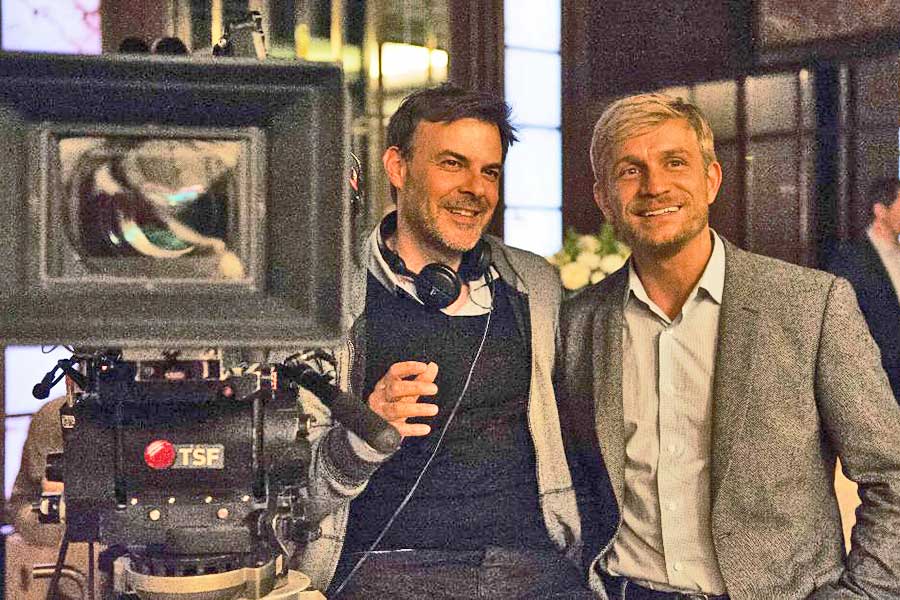“Double Lover,” the latest film by gay writer/director François Ozon, has Chloé (Marine Vacth) falling in love with Paul (Jérémie Renier), her psychologist. When she discovers Paul has a twin, Louis (Renier in a double role), Chloé starts seeing him behind his brother’s back.
This nifty psychosexual thriller, which opens Feb. 14 at Landmark Ritz East, is a heady and visually dynamic puzzler, featuring many eye-popping shots involving mirrors, reflections and windows, plus a few graphic sex scenes — one notably imagining a threesome.
Ozon chatted with PGN about his new film, secret lives and his fascination with twins.
PGN: What made you adapt this particular Joyce Carol Oates book? Do you have a fascination with twins?
FO: I love stories about twins and I love to use mirrors in my movies. I discovered the book because of a French review that they explain Oates had a double — she writes under a pseudonym. I was curious what she wrote as Rosamond Smith. I loved the story and thought it would be good material for a psychosexual thriller. So I made my own adaptation, and set it in France. I am a big fan of books about psychiatry and neurotic people.
PGN: I like how Louis represents the body and Paul represents the mind. Chloé can be in love with both twins for different attributes. What are your thoughts about how desire can be focused physically and intellectually?
FO: That’s a good interpretation. I didn’t have that in mind making the film. I think everybody needs to have a double life — not a lover, but at least in your mind. You have to have things you don’t do with your husband or wife; a secret life. It can be in your head, if not in reality. Everybody needs that. Chloé has a charming husband, but maybe she wants something else because it’s never enough.
PGN: How did you work with Jérémie Renier on playing the double role?
FO: It’s difficult, but a real pleasure for actors is to play twins. An actor is a twin; they have two personalities. And they love to compose a character — it’s very exciting. Jérémie enjoyed playing the two parts and imagining their differences. We had fun. We tried different levels of him being mean or nice to have the choice in editing to compose the character. The good thing with Jérémie was that we shot chronologically, so we did all the scenes with Paul and then Louis so he didn’t play both parts in the same day. It was one, then the other.
PGN: The film uses a doubling framework to investigate how and why people lead double or secret lives. Can you talk about this theme, which is a hallmark of your work?
FO: That may be my problem in my life! Maybe my double life is being a director? I like the complexity of psychology and character. I don’t like when people are just one thing. I think you have different sides in your personality. You can be different with friends and I think we need that — to have a second or secret life to support the reality. Life is like a metaphor for art. We need fiction. It doesn’t mean it exists; we need to dream and have fantasies. If I couldn’t make films, I don’t know what I’d be — maybe a murderer!
PGN: Can you discuss this visual approach to your film with the mirrors and reflections?
FO: It’s a very visual movie. I wanted the first 10 minutes with the psychologist sessions to have Chloé talking nonstop. Then it gets more visual, and is told by the framing. It’s a film about the unconscious. I thought I could be free to express strong visual effects, and I didn’t have to be realistic. I could play with zooms and split screens that I normally don’t use. In the case of this film, I had the freedom to explore many things.
PGN: What can you say about the sex in the film? Were these graphic moments meant to shock or titillate the viewer? Why depict them?
FO: The film I made before this one, “Frantz,” was very classical. I realized after I finished the film that it was chaste. It had no sex scenes. I had to go back to sex. I wanted to have fun and explore things I’d never done before with sexuality. With twins, you are obliged to see a sex scene with twins. I also wanted to show the sexuality of women and things you are not used to seeing. It was interesting to play with that.
PGN: I’m a twin, and I would never have a threesome with my twin!
FO: I’m perverse.
PGN: The film plays with reality and fantasy; it’s even camp at times. Can you talk about shifting tones?
FO: I’m a manipulator. I’m playing with you. I like to play games with the audience. I don’t make a difference between reality, fantasy and dreams. Everything is shot in the same level. That gives you the opportunity to imagine and project. I did that in “Swimming Pool.” Buñuel said you have to film dreams like reality and reality like dreams. That’s something I like to do in my movies. At the end, I think things are clear.

